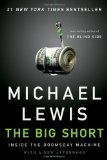I worked in the information technology department of a mortgage bank in the run-up to the 2007 implosion of the subprime mortgage market . . .
Given that it was fairly evident at the time that complicated financial instruments were being dreamed up for the sole purpose of lending money to people who could never repay it, it’s remarkable that very few people foresaw the catastrophe and that even fewer actually had the nerve to bet on it to happen.
Long story short, the major rating agencies — Standard and Poor’s and Moody’s — were incompetent in their rating of subprime mortgage bonds, giving investment-grade and, in some cases, triple-A ratings to high-risk instruments. A lot of people took the ratings — which implied that subprime mortgage derivatives were no riskier than U.S. Treasury bonds — at face value and acted accordingly.
But there were also some interesting psychological factors in play, not specific to the investment arena:
- Nothing really bad had ever happened in the subprime mortgage market. Every tiny panic was followed by a robust boom. Since nothing really bad had ever happened (albeit over a short and statistically insignificant period of time), nothing really bad ever would happen.
- The collapse of the subprime mortgage market would be a national catastrophe, and was unlikely precisely because it would be such a catastrophe. Nothing that bad could ever actually happen.

